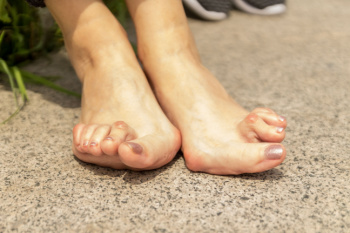
When it comes to walking versus running, the distinction goes beyond just pace and intensity. As experts note, the mechanics of each activity necessitate specific footwear for walking and running. For walkers, shoes with soft, flexible soles are recommended to absorb the impact of each step and facilitate the rolling motion from heel to toe. Runners require thicker-soled shoes for ample shock absorption, given the varied striking points on the foot during a run. It is important to remember that while running shoes can serve for walking, the reverse is not recommended by experts. Footwear plays a critical role in preventing foot injuries like plantar fasciitis and Achilles tendonitis, but shoes alone cannot resolve existing issues. Seeking guidance from a podiatrist is essential if foot discomfort persists. To ensure the right shoe fit, have your arch and gait evaluated. For advice with foot pain related to either walking or running, it is suggested that you schedule an appointment with a podiatrist for a full exam and diagnosis. The appropriate treatment options will follow, including suggestions on the right type footwear for the activity.
For more information about walking shoes versus running shoes, consult with Dr. Richard DiMario from Maine. Our doctor can measure your feet to determine what your needs are and help you find an appropriate pair of footwear.
Foot Health: The Differences between Walking & Running Shoes
There are great ways to stay in shape: running and walking are two great exercises to a healthy lifestyle. It is important to know that running shoes and walking shoes are not interchangeable. There is a key difference on how the feet hit the ground when someone is running or walking. This is why one should be aware that a shoe is designed differently for each activity.
You may be asking yourself what the real differences are between walking and running shoes and the answers may shock you.
Differences
Walking doesn’t involve as much stress or impact on the feet as running does. However, this doesn’t mean that you should be any less prepared. When you’re walking, you land on your heels and have your foot roll forward. This rolling motion requires additional support to the feet.
Flexibility – Walking shoes are designed to have soft, flexible soles. This allows the walker to push off easily with each step.
If you have any questions, please feel free to contact our office located in York, ME . We offer the newest diagnostic and treatment technologies for all your foot care needs.

Custom orthotics, often associated with runners or athletes, offer benefits beyond the realm of sports. These specialized shoe inserts are designed to address imbalances in foot structure, which can significantly impact posture and overall body alignment. Even a minor imbalance can lead to problems throughout the body. Orthotics may be beneficial if you notice uneven wear on the soles of your shoes or have frequent ankle sprains. Chronic pain in the heels, misaligned toes, or abnormal foot positioning during walking are other reasons that orthotics may be needed. By providing support and stability, orthotics help distribute weight more evenly across the foot, reducing strain on muscles and joints. They can correct biomechanical issues, improve gait efficiency, and alleviate discomfort associated with various conditions. Whether you are an athlete or someone seeking relief from everyday discomfort, custom orthotics offer a simple yet effective solution to enhance foot function and promote overall well-being. If you are interested in learning more about how custom-made orthotics can help you, it is suggested that you consult a podiatrist.
If you are having discomfort in your feet and would like to try orthotics, contact Dr. Richard DiMario from Maine. Our doctor can provide the care you need to keep you pain-free and on your feet.
What Are Orthotics?
Orthotics are inserts you can place into your shoes to help with a variety of foot problems such as flat feet or foot pain. Orthotics provide relief and comfort for minor foot and heel pain but can’t correct serious biomechanical problems in your feet.
Over-the-Counter Inserts
Orthotics come in a wide variety of over-the-counter inserts that are used to treat foot pain, heel pain, and minor problems. For example, arch supports can be inserted into your shoes to help correct overarched or flat feet, while gel insoles are often used because they provide comfort and relief from foot and heel pain by alleviating pressure.
Prescription Orthotics
If over-the-counter inserts don’t work for you or if you have a more severe foot concern, it is possible to have your podiatrist prescribe custom orthotics. These high-quality inserts are designed to treat problems such as abnormal motion, plantar fasciitis, and severe forms of heel pain. They can even be used to help patients suffering from diabetes by treating foot ulcers and painful calluses and are usually molded to your feet individually, which allows them to provide full support and comfort.
If you are experiencing minor to severe foot or heel pain, it’s recommended to speak with your podiatrist about the possibilities of using orthotics. A podiatrist can determine which type of orthotic is right for you and allow you to take the first steps towards being pain-free.
If you have any questions please contact our office located in York, ME . We offer the newest diagnostic and treatment technologies for all your foot and ankle needs.

Foot pain caused by arthritis can be debilitating, affecting mobility and quality of life. Arthritis in the feet often presents with symptoms such as joint stiffness, swelling, tenderness, and reduced range of motion. This pain may worsen with activity and improve with rest, making it challenging to engage in daily tasks comfortably. Different types of arthritis can affect the feet, including osteoarthritis, rheumatoid arthritis, and gout. Osteoarthritis typically develops due to wear and tear on the joints over time, while rheumatoid arthritis is an autoimmune condition that affects the lining of the joints. Gout results from the accumulation of uric acid crystals in the joints. If you have foot pain that persists or worsens, especially if accompanied by other symptoms like swelling or warmth in the joints, it is suggested that you schedule an appointment with a podiatrist for an accurate diagnosis and treatment. If the pain is determined to be arthritic, a podiatrist can offer relief methods to help maintain mobility and enhance your quality of life.
Arthritis can be a difficult condition to live with. If you are seeking treatment, contact Dr. Richard DiMario from Maine. Our doctor can provide the care you need to keep you pain-free and on your feet.
Arthritic Foot Care
Arthritis is a joint disorder that involves the inflammation of different joints in your body, such as those in your feet. Arthritis is often caused by a degenerative joint disease and causes mild to severe pain in all affected areas. In addition to this, swelling and stiffness in the affected joints can also be a common symptom of arthritis.
In many cases, wearing ill-fitting shoes can worsen the effects and pain of arthritis. Wearing shoes that have a lower heel and extra room can help your feet feel more comfortable. In cases of rheumatoid arthritis, the arch in your foot may become problematic. Buying shoes with proper arch support that contour to your feet can help immensely.
Alleviating Arthritic Pain
It is best to see your doctor for the treatment that is right for your needs and symptoms. Conditions vary, and a podiatrist can help you determine the right method of care for your feet.
If you have any questions, please feel free to contact our office located in York, ME . We offer the newest diagnostic tools and technology to treat your foot and ankle needs.

Rheumatoid arthritis, or RA, a chronic autoimmune condition, can have a profound effect on the feet, causing pain, swelling, and stiffness that significantly impair mobility and quality of life. In RA, the immune system mistakenly attacks the lining of the joints, many of which are in the feet, leading to inflammation and joint damage. Common symptoms of RA in the feet include tender, swollen joints, particularly in the toes and ankles, and difficulty walking or bearing weight due to pain and stiffness. Over time, untreated RA can cause deformities such as bunions, hammertoes, or flat feet, further compromising foot function and comfort. Additionally, RA can increase the risk of other foot problems, such as corns, calluses, or ulcers, particularly if mobility is limited or proper foot care is neglected. If you are afflicted by this condition, it is suggested that you are under the care of a podiatrist who can accurately diagnose RA and provide you with a comprehensive management plan.
Because RA affects more than just your joints, including the joints in your feet and ankles, it is important to seek early diagnosis from your podiatrist if you feel like the pain in your feet might be caused by RA. For more information, contact Dr. Richard DiMario of Maine. Our doctor will assist you with all of your podiatric concerns.
What Is Rheumatoid Arthritis?
Rheumatoid Arthritis (RA) is an autoimmune disorder in which the body’s own immune system attacks the membranes surrounding the joints. Inflammation of the lining and eventually the destruction of the joint’s cartilage and bone occur, causing severe pain and immobility.
Rheumatoid Arthritis of the Feet
Although RA usually attacks multiple bones and joints throughout the entire body, almost 90 percent of cases result in pain in the foot or ankle area.
Symptoms
Diagnosis
Quick diagnosis of RA in the feet is important so that the podiatrist can treat the area effectively. Your doctor will ask you about your medical history, occupation, and lifestyle to determine the origin of the condition. Rheumatoid Factor tests help to determine if someone is affected by the disease.
If you have any questions please feel free to contact our office located in York, ME . We offer the newest diagnostic and treatment technologies for all your foot and ankle needs.